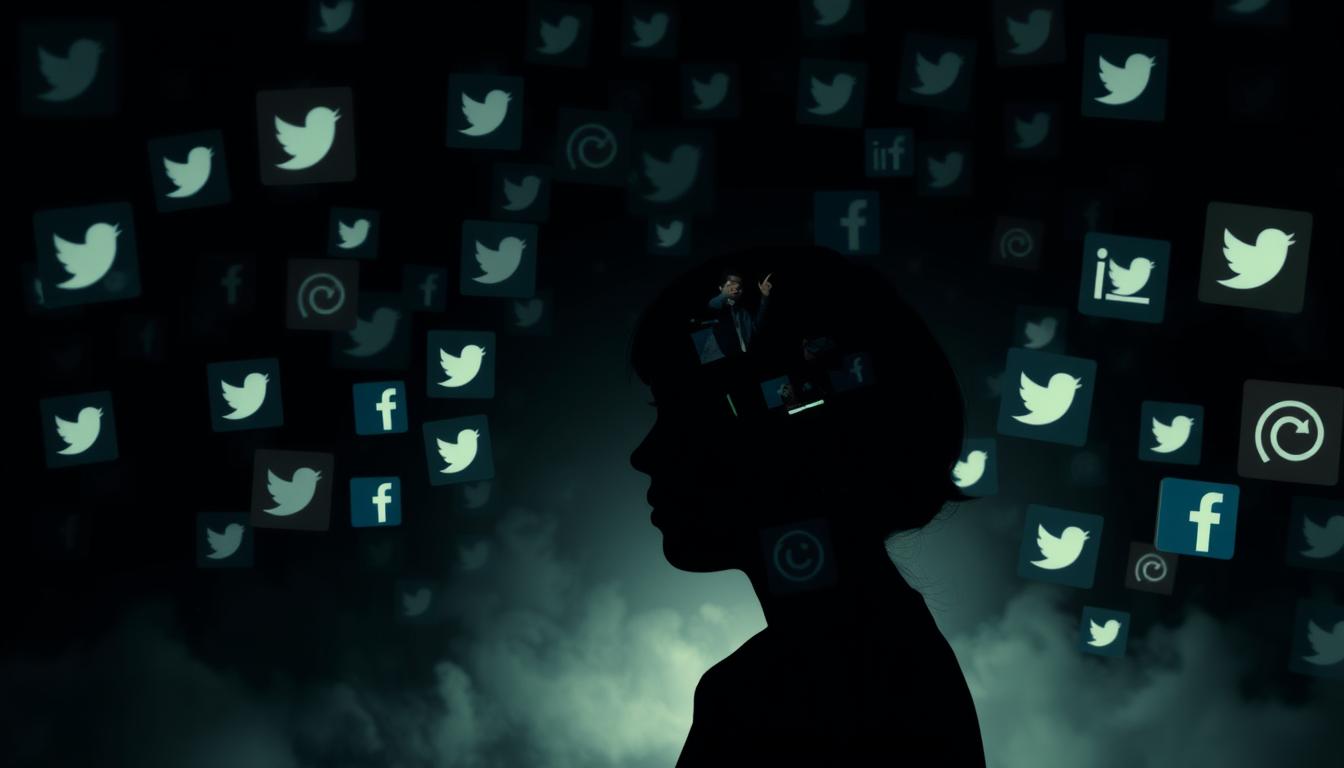The rise of social media has made online defamation more harmful. People who face slander and false claims can feel stressed, anxious, and isolated. These damaging claims can cause lasting harm to their reputation, emotions, and finances.
At Reputation Return, we know how hard digital attacks can be. Our team helps people deal with online defamation from narcissists. We offer solutions to help them take back control of their online image and protect their mental health.
Dealing with online defamation is tough, but it’s not impossible. With the right help, people can overcome emotional challenges and rebuild their reputation. Reputation Return is here to support our clients in reclaiming their online presence and finding peace again.
Understanding the Psychological Effects of Digital Attacks
Digital attacks like online defamation and cyberbullying can deeply affect people’s minds. 90% of young people around the world have experienced some form of bullying. 7 out of 10 young people have faced online abuse at some point.
Fear and Social Withdrawal
Victims of digital attacks often feel intense fear and anxiety. This can make them shy away from online interactions. They might become emotional recluses, isolating themselves from the platforms where the attacks happened.
This fear and constant watchfulness can deeply affect their sense of safety and happiness.
Impact on Professional and Personal Relationships
Digital attacks can harm victims’ professional and personal lives. As their online reputation is damaged, they may struggle to keep good relationships with colleagues, friends, and family. The cyberbullying impact can make them less engaged, more likely to leave their jobs, and less satisfied with their work.
Anxiety and Depression Symptoms
Victims of digital attacks often show signs of anxiety and depression. Nearly one in every eight individuals globally experiences mental health issues. Depression affects almost 3.8% of the world’s population.
The fear of being searched online and the emotional turmoil from online harassment effects can cause hypervigilance, anger, self-guilt, and even suicidal thoughts.
It’s vital to address the psychological effects of digital attacks for defamation recovery tips and to help victims recover. Understanding these emotional impacts is the first step in offering the right support and solutions.
Online Defamation and Mental Health: Recognition and Response
In today’s world, online defamation is a big threat to our mental health. People who face cyber attacks can feel really down. They might lose their self-esteem, struggle with daily tasks, and pull back from social activities. It’s key to spot these signs early to tackle them effectively.
Recent studies found that 46.3% of Italian adults have been victims. They often feel angry, sad, and even get physical symptoms like trouble sleeping and stomach issues. Women and LGBTQA+ folks are especially at risk, facing more attacks.
When dealing with online defamation, staying calm and focused is crucial. Start by collecting evidence and figuring out who’s behind it. Getting help from mental health professionals is also super important. They can help victims feel better and more in control.
| Symptom | Prevalence |
|---|---|
| Depressive symptoms | 22.4% |
| Generalized anxiety disorder symptoms | 34.0% |
By understanding the mental health effects of online defamation and acting fast, we can protect ourselves. Working together with online sites, lawyers, and mental health experts is key. This way, we can lessen the harm and help people heal.

Essential Steps for Recovery and Protection
Recovering from online defamation takes a lot of steps. First, you need to document and preserve evidence of the defamatory content. This means taking screenshots, saving URLs, and gathering any other important documents for legal action.
Having a strong support network is key. Talk to friends, family, and mental health professionals for emotional and practical help. Queer and trans individuals, who face higher risks of online harassment and doxing, should seek specialized resources and support.
Legal and Professional Assistance Options
Getting legal advice and online reputation management services is very helpful. Victims can take legal steps like reporting content or filing lawsuits. In some places, Harassment Prevention Orders or Civil Protection Orders can protect you from further harassment.
Reputation Return provides detailed solutions against online defamation. They offer free consultations to create strategies for each case. Their team helps with defamation recovery tips, online reputation management, and legal action for defamation.
By being proactive and taking many steps, you can lessen the effects of online defamation. Remember, you’re not fighting alone. There are many resources and professionals ready to help you.
Conclusion
Recovering from online defamation is tough but doable. It needs emotional strength, practical steps, and expert help. The internet can be harsh, but there are ways to protect and fix your online image. This conclusion stresses the need for active reputation care and getting help for online attacks.
Reputation Return is here to help people and businesses deal with online reputation issues. We offer custom solutions to fight back against defamation and digital attacks. Our goal is to help you regain your place online through effective strategies.
If you’ve faced an online attack or want to protect your brand, Reputation Return is here for you. We provide the support and tools you need to beat online defamation. Together, we can build your digital resilience and keep your online image true to who you are or what your brand stands for.












